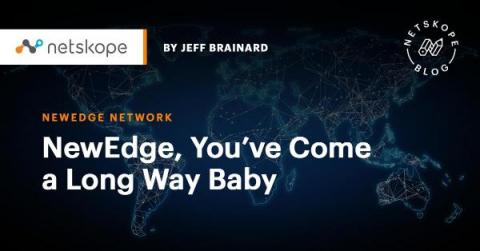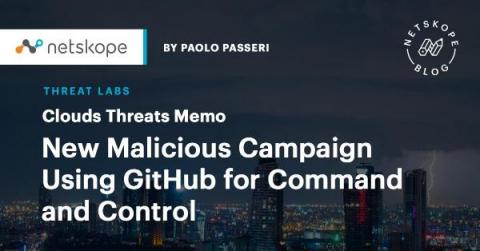Security | Threat Detection | Cyberattacks | DevSecOps | Compliance
Security
NewEdge, You've Come a Long Way Baby
Just over three years ago, Joe DePalo joined Netskope as Senior Vice President of Platform Engineering. He had most recently led the infrastructure design and build-out at AWS, the world’s largest public cloud, and prior to that, engineering and operations for one of the largest content delivery networks (CDNs) at Limelight Networks.
Cloud Threats Memo: New Malicious Campaign Using GitHub for Command and Control
State-sponsored threat actors continue to exploit legitimate cloud services. In their latest campaign, uncovered by Malwarebytes during January 2022, the North Korean group Lazarus (AKA HIDDEN COBRA) has been carrying out spear phishing attacks, delivering a malicious document masquerading as a job opportunity from Lockheed Martin (37% of malware is now delivered via Office documents).
Securosis Webinar New Age Network Detection
XDR: The Importance of Network Technology
Government gets serious: deadlines for Zero Trust Architectures
Since the 1990s, the federal government has been issuing guidelines and recommendations for security via their 800-Series Special Publications. While some of those guidelines became mandates, things have largely inched forward, instead of making any dramatic leaps. OMB’s new memorandum M-22-09, “Moving the U.S. Government Towards Zero Trust Cybersecurity Principles,” is changing this pattern, and setting deadlines for implementation across the government.
Cybersecurity in Competitive Online Gaming (Cheating, Mitigation, and Vulnerabilities)
As the competitive online gaming and eSports industries gain legitimacy by becoming more popular and attracting mainstream attention, the question of competitive integrity lingers in the back of my mind. Can the game’s developers, community, and users maintain and uphold competitive integrity? Or will they fold under the pressure of greed and complacency?
What is Unstructured Data?
Unstructured data is data that cannot be processed and analyzed using conventional data tools and methods: qualitative data, such as customer feedback or social media posts are considered unstructured data. Unstructured data is particularly prevalent in the healthcare industry, where patient records, doctors’ notes, and other unstructured data can make upward of 80% of data within a healthcare organization.
Channeling Regulatory Requirements into Practical Cyber Risk Assessments
Does the saying "compliance does not equal security" paint a holistic picture? Sure, the concept is genuine; meeting a single compliance standard will not directly improve security posture. However, after working with hundreds of organizations, we have learned there are key considerations that can help maximize the value and urgency of compliance requirements by channeling such efforts into more practical risk assessments.











